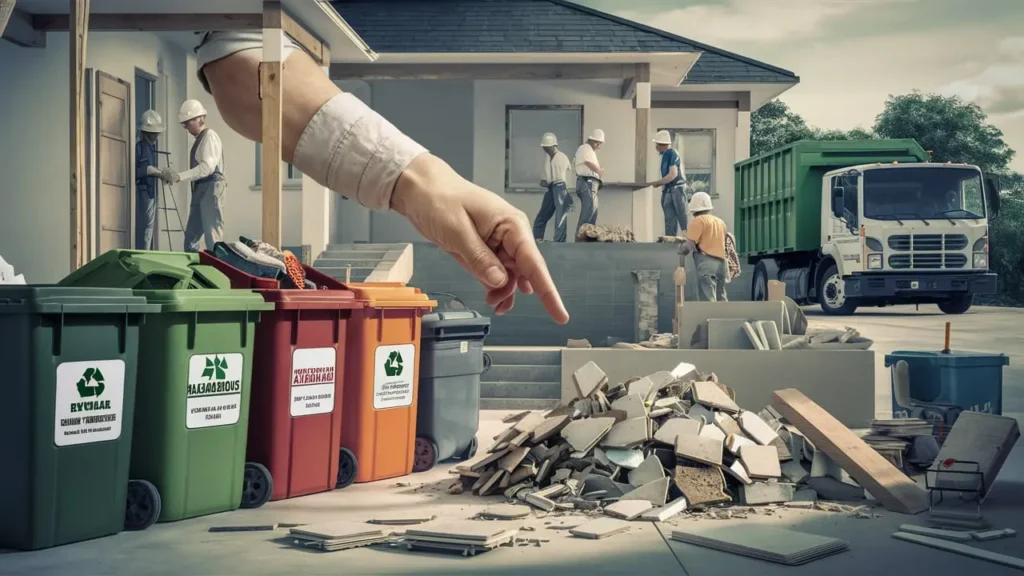Home renovation projects bring a lot of excitement and potential to transform your living space, but they also produce a significant amount of waste. Effective waste management is essential to maintaining an organized work environment and minimizing environmental impact. With the right strategy, you can handle your renovation waste efficiently, ensuring a smoother project and a cleaner environment. This comprehensive guide provides actionable tips on achieving effective waste management during renovations, including methods for disposal, recycling, and selecting the proper dumpster service.
Proper planning and understanding your waste volume can streamline your renovation project and help you avoid unnecessary costs. Utilizing professional services like a commercial dumpster can significantly simplify the process, making waste management less of a headache. Here’s everything you need to know to manage your home renovation waste effectively.
Key Takeaways
- Learn practical waste disposal methods during home renovations
- Understand the importance of recycling and environmentally-friendly practices
- Get tips on selecting the correct dumpster service for your needs
Planning Your Renovation Project
Set Clear Goals
Before you even begin demolition, it’s crucial to define the scope of your project. Determine what you aim to achieve and identify potential challenges. Planning well from the start allows you to estimate the amount of waste your project will generate. A commercial dumpster service is one efficient way to manage this waste. Additionally, budgeting for waste management costs can save you from unexpected expenses. Establish clear objectives and allocate resources for waste management. Detailed planning reduces the risk of costly mistakes, ensuring a smoother renovation process.
Estimate Waste Volume
Taking stock of the type and volume of waste helps choose the appropriate dumpster size. Whether you’re disposing of old drywall, tiles, or wooden beams, understanding the waste types ensures you know your needs, making waste management more efficient. Accurately estimating waste volume can also prevent project delays caused by inadequate disposal solutions. This step is crucial in ensuring that all waste is handled efficiently, reducing the environmental footprint of your renovation.
Selecting the Right Dumpster Service
Understanding Dumpster Sizes
Selecting the proper dumpster size is critical. For small-scale renovations like bathroom makeovers, a smaller dumpster might suffice. However, large-scale projects like home remodels will require a more substantial option. Consult with your service provider to select a size that matches your project’sproject’s needs. Misjudging the size can lead to additional costs and inefficiencies, as repeatedly removing and re-renting dumpsters can disrupt your project’s timeline.
Rental Duration
Aligning the rental period of your dumpster with your project timeline can help avoid additional costs during a renovation project. Most services offer flexible rental durations, so choose one that fits your needs to prevent premature pickups or late fees. Plan your renovation schedule meticulously to coincide with your dumpster rental period. This synchronization minimizes hassle and ensures the disposal process integrates smoothly with your renovation activities.
Disposing of Construction Debris Properly
Segregate Waste
One of the most effective ways of managing renovation waste is by segregating various types of debris—separate recyclable items such as metals, plastics, and certain kinds of wood from general waste. Proper segregation ensures eco-friendly disposal and can also reduce costs. For instance, metals can be sold to scrap yards, and wood can often be repurposed. Implementing waste segregation systems helps streamline the recycling process and reduces the volume of materials sent to landfills.
Hazardous Materials
Identifying any hazardous materials you might be disposing of, such as asbestos, lead paint, or certain chemicals, is essential. Improper disposal of these items can harm human health and the environment. For more information on safe disposal practices, you can visit the EPA’s official guidance on hazardous waste. Understanding and identifying hazardous materials is essential to comply with local regulations and safety standards during your renovation.
Maximizing Recycling Efforts
Recycle Building Materials
Recycling offers both environmental and financial benefits. Metal, wood, and concrete can often be recycled and repurposed. Before tossing everything into the dumpster, identify items that can be taken to recycling centers or reused in other projects. For example, metal can be melted down and reused, while wood can be processed into mulch. This helps the environment and reduces disposal costs by decreasing the total waste volume you need to manage.
Donation and Reuse
Donating usable items like cabinets, doors, or fixtures to local charities is another excellent way to manage waste. Not only does it reduce the amount of waste sent to landfills, but it also benefits those in need. For more recycling tips and methods, check out resources available at Earth911. Incorporating donation and reuse strategies into your renovation plan can extend the life of building materials and support your community, adding more value to your project by contributing to social welfare.
Hiring Professionals for Efficient Waste Management
Benefits of Professional Services
Engaging professional waste management services can save you a tremendous amount of time and effort. Professionals are well-versed in local regulations and can ensure that waste is disposed of responsibly, complying with all necessary guidelines. They can also help with hazardous waste disposal and offer insights into recycling significant portions of your waste, contributing to a greener project. Utilizing professional services ensures your waste is handled efficiently and complies with all legal requirements.
What to Look for in a Professional
When hiring a professional waste management service, it’s important to look for the best contractors near me with substantial renovation waste experience. Check their reputation through online reviews and ask for references to ensure you make an informed choice. Look for services that offer tailored waste management plans, competitive pricing, and excellent customer service. Making an informed decision when choosing a professional service provider can lead to a more streamlined and less stressful renovation experience.
Utilizing Green Disposal Methods
Eco-Friendly Practices
Adopting eco-friendly disposal methods can make your renovation project greener. Opt for recyclable packaging and environmentally-friendly materials to minimize waste from the start. An effective strategy here includes composting organic waste like wood chips and plant debris. Eco-conscious decisions during the planning phase can result in less waste generation overall, promoting sustainability throughout your renovation. Consider using non-toxic paints and materials that have a reduced environmental footprint.
Cost Management Tips
Budget for Waste Disposal
Including waste management in your renovation budget can help avoid unexpected costs. Plan for the expense of dumpster rentals, landfill fees, and potential recycling costs to keep your project financially on track. Detailed budgeting helps you maintain control over the entire project, ensuring that waste disposal does not become a financial burden. Allocating funds for waste management upfront ensures you have the resources available to handle all aspects of waste disposal effectively.
Save Money by Recycling
Recycling can significantly reduce the waste you need to dispose of in landfills, reducing disposal costs. Many recycling centers offer free or reduced rates for specific materials, making it a cost-effective way to manage waste. Additionally, selling recyclable materials like metal can provide extra income that offsets waste management costs, making recycling a financially savvy choice. Implementing robust recycling practices helps the environment and contributes significant cost savings throughout your renovation.
Conclusion
Efficient waste management during home renovations is critical for a smooth and cost-effective project. Proper planning, selecting the right services, and adhering to eco-friendly practices are essential. Professional help can provide peace of mind and compliance with regulations while recycling efforts contribute to environmental sustainability. Integrating these strategies allows you to manage your renovation waste effectively and sustainably. Employing the right resources and maintaining a mindful approach can transform waste management from a daunting task into a manageable, even beneficial, aspect of your renovation project.





